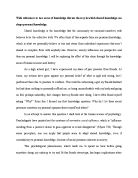To what extent are areas of knowledge shaped by their past? Consider with reference to two areas of knowledge.
To what extent are areas of knowledge shaped by their past? Consider with reference to two areas of knowledge.
In an attempt to better understand truth, humans have been developing various knowledge frameworks over centuries. Although we may accept a certain set of knowledge claims in the present, we often build on past developments in order to do so. This raises the question: To what extent have past developments shaped our understanding of current knowledge areas? I will be exploring this question in reference to two areas of knowledge: religious knowledge systems and mathematics.
Religions are based on a set of beliefs which are commonly derived from the teachings of a particular religious founder and outlined in a sacred religious text that acts as an authority on all religious knowledge. These texts and teachings are essentially an artefact of the past as they are based on past events, as recorded by our ancestors. The Koran for example, is a record of the God’s revelations as spoken to Muhammed during his life while the Bible records Jesus’s life and his journey to absolve humans of all sin. Followers of a certain religion have faith that their teachings will not alter from day to day and that is why they obey them. The recording of religious knowledge in scripture means that central beliefs of a religion, such as the noble eightfold path of Buddhism and the Ten Commandants of Christianity, do not alter and this is true even for a religion as diverse and decentralised as Hinduism where the concepts of karma, moksha and the nature of truth have remained the same over large time scales and vastly different geographical locations and cultures. Therefore, it would appear that the central beliefs of each religion, which were conceived through past events, determine much of what is considered to be true in the present.
However, current religious knowledge is not completely determined by religious knowledge of the past because discrepancies in the sharing of this knowledge alter it slightly from generation to generation. Religious texts attempt to convey their beliefs through written language but as language itself evolves over time, the nuances of some ancient phrases and words recede into obscurity. These nuances, although slight, can result in significantly different interpretations of religious beliefs. For example, the sentence “a life for a life, an eye for an eye, a nose for a nose, an ear for an ear, a tooth for a tooth, and for wounds is legal retribution”[1] appears in the Koran. Muslim scholars generally interpret it in light of the rest of the passages in the Koran where Prophet Muhammed distinctly teaches his disciples to forgive those who have done them wrong (known as mustahab), and only when they themselves are morally incapable of doing so, seek compensation or retributive justice that does not exceed the harm caused to them. However, these same verses are interpreted differently by Islamic extremists who claim that the specific words used in this “eye for an eye” passage place an emphasis on a violent path to justice in a wider majority of circumstances and then use this interpretation to justify their many abhorrent attacks on humanity. Alternatively, the original meaning of ancient texts can be preserved by translating it into the modern language of the day but even in this process, the original text is inevitably embedded with the attitudes and ideas of the present. Martin Luther formed several interpretations of the Bible which conflicted with those of the Roman Catholic Church. When he translated the Latin Bible to common German, it was inevitably imprinted with these beliefs, for example, he included the word “alone” after “faith” in Romans 3:28 to convey that faith is the defining way of knowing in Christianity, more so than the law. This translation was criticized by many as altering the message of the Roman Catholic Church (for example, by implying that normal citizens were justified in their actions if they did so in good faith, even if the church authorities deemed it to be wrong) but Luther defended it by claiming that was a necessary part of modern German syntax and, according to his interpretation, it is what St Paul was implying anyway [2]. This edited translation gave rise to Lutheranism and influenced many branches of Christianity, including Protestantism. Thus, changing interpretations of the same text due to the evolution of language or deliberate translations inevitably result in changes to previously accepted religious beliefs.








